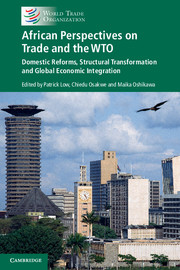 African Perspectives on Trade and the WTO
African Perspectives on Trade and the WTO Book contents
- African Perspectives on Trade and the WTO
- African Perspectives on Trade and the WTO
- Copyright page
- Contents
- Figures
- Plates
- Contributors
- Message
- Joint Foreword
- Book part
- Glossary
- Disclaimer
- 1 Introduction and Overview
- Part I The Future of the Multilateral Trading System: Perspectives from African Policy-Makers and Partners
- 2 African Union Priorities at the WTO
- 3 Economic Diversification in Africa’s Number One Economy
- 4 Trade, Investment and Development
- 5 Integration into Global and Regional Value Chains – How Is It Done? The Experience of Lesotho in the Textiles and Apparel Sector
- 6 From Marrakesh to Nairobi: Africa – A Force for the World Trading System: From the Past Twenty Years to the Next Twenty Years
- 7 Building Capacity in Africa to Facilitate Integration into Global Value Chains: Contributions from the ITC
- 8 Investment and Trade Rules: Increasing the Stock of African Foreign Direct Investment Flows
- 9 Deepening African Integration: Intra-African Trade for Development and Poverty Reduction
- Part II Africa’s Participation in the Rules-Based Multilateral Trading System
- Part III Selected Development Experiences and Perspectives
- Book part
- Index
- Plate Section (PDF Only)
- Book part
6 - From Marrakesh to Nairobi: Africa – A Force for the World Trading System: From the Past Twenty Years to the Next Twenty Years
from Part I - The Future of the Multilateral Trading System: Perspectives from African Policy-Makers and Partners
Published online by Cambridge University Press: 27 October 2016
- African Perspectives on Trade and the WTO
- African Perspectives on Trade and the WTO
- Copyright page
- Contents
- Figures
- Plates
- Contributors
- Message
- Joint Foreword
- Book part
- Glossary
- Disclaimer
- 1 Introduction and Overview
- Part I The Future of the Multilateral Trading System: Perspectives from African Policy-Makers and Partners
- 2 African Union Priorities at the WTO
- 3 Economic Diversification in Africa’s Number One Economy
- 4 Trade, Investment and Development
- 5 Integration into Global and Regional Value Chains – How Is It Done? The Experience of Lesotho in the Textiles and Apparel Sector
- 6 From Marrakesh to Nairobi: Africa – A Force for the World Trading System: From the Past Twenty Years to the Next Twenty Years
- 7 Building Capacity in Africa to Facilitate Integration into Global Value Chains: Contributions from the ITC
- 8 Investment and Trade Rules: Increasing the Stock of African Foreign Direct Investment Flows
- 9 Deepening African Integration: Intra-African Trade for Development and Poverty Reduction
- Part II Africa’s Participation in the Rules-Based Multilateral Trading System
- Part III Selected Development Experiences and Perspectives
- Book part
- Index
- Plate Section (PDF Only)
- Book part
Summary
Morocco’s membership of the GATT and WTO has been part of an overall strategy of the Government of the Kingdom of Morocco, at the instigation of the late King Hassan II, to introduce a package of institutional and socio-economic reforms, which sought mainly to modify and diversify the structure of the national economy, optimize the allocation of its resources and ensure its integration into the world economy. Being a Member of the Multilateral Trading System is also an expression of the government’s wish to integrate more fully into the world economy by anchoring its reforms in the legal primacy of an international agreement, rather than just in domestic legislation, as reaffirmed by the Constitution adopted in 2011. In doing so, Morocco made opening up its economy a firm and irreversible commitment.
Through the WTO and its wide network of free trade agreements, Morocco is moving to the next phase of its trade and investments policies, focusing on value-added exports and world-class infrastructures as well as on renewable energy. Twenty years after Marrakesh, the system still carries value for Morocco and Africa and will certainly be a tool for trade and investments in the next two decades. Africa’s role needs to be strengthened. While Africa’s share in world trade has improved considerably over the past decade, it is difficult to accept that a continent which represents more than the 15 per cent of the world’s population should still account for only 3 per cent of world trade. The legitimate objective that we should probably all be pursuing over the next few decades is matching Africa’s share in world trade with its share in the world’s population.
- Type
- Chapter
- Information
- African Perspectives on Trade and the WTODomestic Reforms, Structural Transformation and Global Economic Integration, pp. 35 - 42Publisher: Cambridge University PressPrint publication year: 2016
